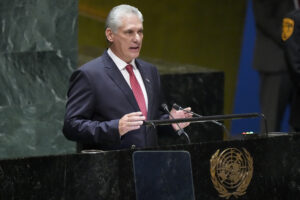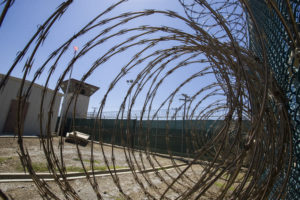Closing Time for Torture Island
Like a terminally ill animal, the Guantanamo prison is soon to be put to death. It will be an ugly execution, played out against the sophomoric non sequiturs that are the unofficial soundtrack of the war on terror.WASHINGTON — Like a terminally ill animal, the Guantanamo prison is soon to be put to death.
It will be an ugly execution, played out against the sophomoric non sequiturs that are the unofficial soundtrack of the war on terror. Why, noted Rep. Duncan Hunter of California to a panel of legal experts who appeared before the House Armed Services Committee last week, during his last visit to the U.S.-run prison for alleged terrorists, the dining options included honey-glazed chicken and lemony fish. The healthcare given these alleged “enemy combatants” is “a higher quality than many HMOs and Americans receive,” said Hunter, the panel’s ranking Republican. “When we left … they had a soccer game going on.”
But no menu grievance — other than complaints about the force-feeding of prisoners on hunger strikes — has figured in the international condemnation and legal uproar over the Bush administration’s detention scheme at Guantanamo Bay, Cuba. Recreation hasn’t been an issue either — unless consideration is given to the repeated reports from lawyers for detainees who say that hundreds have been held in solitary confinement for long periods.
As Australian David Hicks became the first detainee to plea-bargain his way out of the offshore penal colony, it was disclosed that part of his deal prevents him from speaking about the conditions he and others have endured there. Hicks’ nine-month sentence for providing “material support” to terrorists in Afghanistan apparently was engineered between the Bush administration and the government of Australian Prime Minister John Howard, whose chances for re-election later this year have been imperiled by the Australian public’s growing agitation over Hicks’ treatment. Hicks is to serve his time in Australia — his ultimate release contradicting all past American claims that he is such a danger to the civilized world that the wisest policy was to lock him up indefinitely, without charge.
Even as headlines in the United States focused on the outcome of Hicks’ case, and on the Supreme Court’s refusal on Monday to quickly decide the legality of a new system of military tribunals enacted by Congress last year, a more typical result of the Guantanamo saga was unfolding quietly in England.
There, Bisher al-Rawi, a British resident who was held at Guantanamo for five years, returned to his family without having been charged. Al-Rawi, an Iraqi national, had been sent to live in England in 1985 after his father was arrested by Saddam Hussein’s secret police. He was no “enemy combatant” swept off the battlefield in Afghanistan. He was seized during a trip to Gambia, where Americans claimed he was carrying a “suspicious” device in his luggage. It turned out to be a battery charger, his lawyer has said.
“So it was misinformation that started this chain of events,” lawyer Zachary Katznelson told the BBC. “Though unfortunately that led to him first being taken by the CIA to Afghanistan to an underground prison of 24-hour darkness with rats everywhere, to then being taken to Guantanamo — and it took years to right this wrong.”
The absurdities of Guantanamo continue to mount, one atop the other. Hundreds of former detainees once called “the worst of the worst” have been released to their home countries. Almost all have been freed to resume their former lives, their governments having found no reason to hold them. British authorities last year reportedly rejected a U.S. offer to return all of its residents who remain at Guantanamo because Tony Blair’s government wouldn’t submit to American demands to keep the men under strict security supervision. The Defense Department claims that about 20 former detainees have resumed terrorist activities.
Defense Secretary Robert Gates now offers a rare voice of reason. He told the House defense appropriations subcommittee last week that none of the Guantanamo military trials — actually, only three detainees of the 385 men who remain at Guantanamo have been charged — have credibility. Guantanamo, the Pentagon chief said, carries too much of a “taint.”
Gates said he wants to work with Congress to close Guantanamo, transfer most detainees back to their home countries and keep only “hard-core” prisoners for detention at domestic military facilities. It is a path the Bush administration should have taken long ago but — like its determined pursuit of a failed policy in Iraq — has thus far rejected.
Unlike extricating the United States from Iraq, which has serious, long-term national security implications, a political solution that begins to wash away the stain of Guantanamo is straightforward. Its time has come.
Marie Cocco’s e-mail address is mariecocco(at symbol)washpost.com.
© 2007, Washington Post Writers Group
Your support matters…Independent journalism is under threat and overshadowed by heavily funded mainstream media.
You can help level the playing field. Become a member.
Your tax-deductible contribution keeps us digging beneath the headlines to give you thought-provoking, investigative reporting and analysis that unearths what's really happening- without compromise.
Give today to support our courageous, independent journalists.






You need to be a supporter to comment.
There are currently no responses to this article.
Be the first to respond.